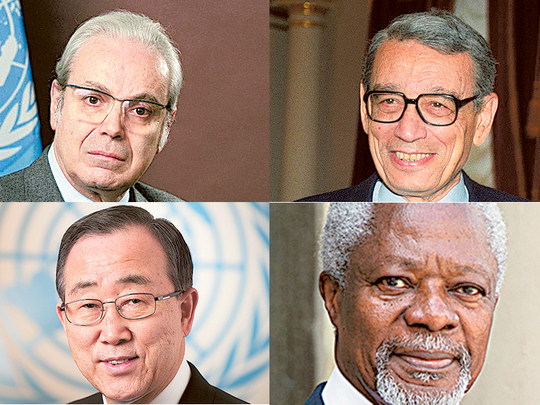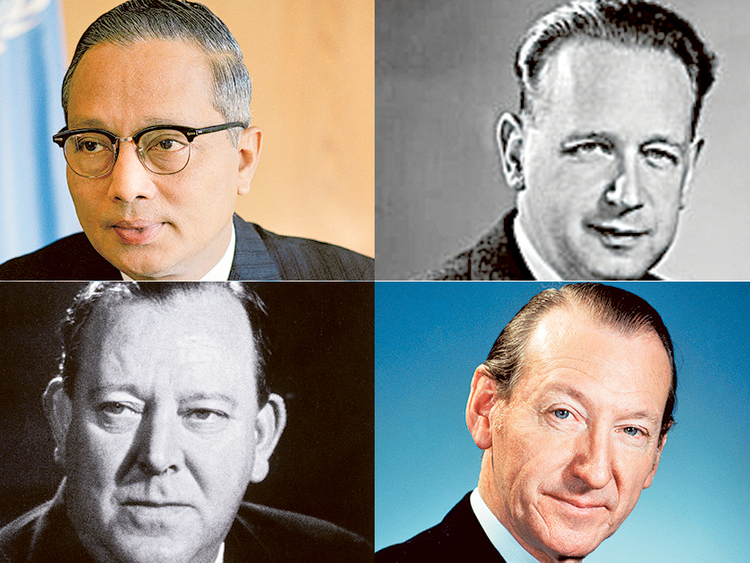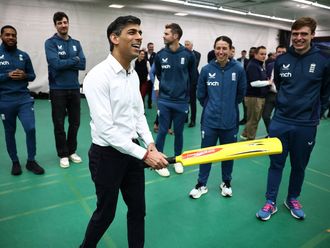
Dubai: Hacked emails, bogus Twitter accounts, smear allegations and backroom deals. Welcome to the race for the international community’s top diplomatic job — United Nations secretary-general.
The eventual winner of the contest will ascend to become a secular saint, an ambassador of peace and voice of the poor and downtrodden. But the road to such a lofty position is paved with landmines and booby traps.
Portugal’s former prime minister Antonio Guterres is maintaining his lead in the race as Bulgaria’s Irina Bokova failed to make a strong showing in the informal vote by the 15-member council, paving the way for European Union vice-president Kristalina Georgieva to possibly replace her as Sofia’s candidate.
Guterres, who served as UN refugee chief for 10 years and was prime minister from 1995 to 2002, picked up 12 votes of encouragement, two “discourage” votes and one “no opinion”, the same result as the previous informal vote.
It was the fifth time that the 67-year-old has taken the number-one spot in the contest to succeed Ban Ki-moon, the former South Korean foreign minister who steps down on December 31 after 10 years as the world’s top diplomat.
Bulgaria’s prime minister, Boyko Borisov suggested earlier this month that he would withdraw support for Bokova if she did not finish first or second in Monday’s ballot, potentially clearing the way for Georgieva to replace her. There was no immediate confirmation from Sofia on Monday evening on whether he would deliver on that threat.
Even if he did, Georgieva would then have to decide whether she wanted to enter a race so far dominated by one candidate.
“The timing might not be right for her,” said a diplomat at the UN. “It is not as if the field is in disarray. There is a clear leader she would be up against.”
Guterres is a surprise frontrunner, as many people had expected the next secretary-general to be an east European and a woman, to break new ground. But the former UN refugee chief was generally considered to have performed well in public hearings in the general assembly, and his advocacy on behalf of refugees is seen as important at a time of mass displacement from wars, terrorism and climate change.
However, his lead is not decisive. A winner must gain at least nine votes and no vetoes from the five permanent council members. It is possible that one or both of the votes against Guterres come from one of the permanent five (P5). Moscow has said it wants an eastern European as the international community’s next top diplomat. A potential veto will only make itself clear in the next round of voting, on October 5 when P5 states will cast coloured ballots.
A Russian veto of Guterres in the face of such broad support could bring western retaliation in the form of vetoes on Russian favourites among the other eight remaining candidates.
“If Guterres is blocked, everyone on the list will be blocked, and we will be looking for new entrants,” said a senior security council diplomat.
Georgieva could face the same barriers as Guterres. She is a senior member of the European commission that is currently imposing sanctions on Russia over its actions in Crimea and eastern Ukraine. Both Guterres and Georgieva would be expected to be activist secretary generals, using all of the powers in the post to put pressure on the Security Council on humanitarian issues. For that reason, both may seem unpalatable to Russia, and possibly China too. Moscow was furious with the current secretary general, Ban Ki-moon, when he challenged Russia on its role in Syria earlier this year.
Moscow argues it is the turn of an eastern European to provide the UN leadership, and may baulk at the former leader of a western European Nato member state taking the helm. The incumbent Ban Ki-moon is from a US treaty ally, South Korea, and was Washington’s preferred candidate 10 years ago.
Last week, a Twitter account in Guterres’ name claimed to have secured Moscow’s support, triggering speculation that the race could be abruptly over. But the account turned out to be a fake.
In second place is Slovakia’s foreign minister, Miroslav Lacjak, who enjoyed a surprise surge from second last after his country’s pro-Russia prime minister, Robert Fico, visited Moscow four days before the third poll and made a point of highlighting his criticisms of EU sanctions on Russia over Crimea. For that reason, Lajcak may face a veto from one or more of the western members of the permanent five.
Third-placed Vuk Jeremi, the former Serbian foreign minister, will almost certainly be vetoed by the US, diplomats say.
Washington has not forgiven Jeremić for his opposition to Kosovar independence, amid its perception that he used his time as president of the general assembly as a platform for nationalist rhetoric.
The threat of vetoes, however, will only become decisive in the next round, when the permanent five will cast coloured ballots. Any candidate who receives a coloured ballot among their discourage votes will know they have hit a stone wall.
Helen Clark, the former New Zealand prime minister and head of the UN Development Programme, is one of several highly qualified women in the race who did far worse than expected in the polls, but she played down the role of sexism.
“If you’re asking whether women are being discriminated against — no,” Clark said. “There are a lot of factors swirling around. There is east-west, there is north-south, there’s the style of what’s wanted in the job. Do they want strong leadership? Do they want malleable? It’s all cross-cutting and we don’t know what will come in the wash.”
Georgieva has also been on the receiving end of dirty tricks. On September 9, the email account of one her staff members was hacked and emails purporting to be from one of her top aides were sent out to the rest of her office, instructing them to attack Bokova. Her camp saw it as an attempt to discredit Georgieva.
The permanent five’s potential vetoes in the secretary general contest are bargaining chips on a table on which rivalry in Syria, Ukraine and other conflicts is being brokered. The poisonous atmosphere in the council could make for a protracted struggle to which the most qualified candidates fall victim, opening the way for a more obscure contender.
The cross currents of geopolitical struggle and Balkan political intrigue, mean that nothing is decided until the last moment. For that reason, candidates with indifferent results in past ballots are staying in the race, at least until the coloured ballots in October.
“The band’s still playing,” Clark said. “Anything can come out of this.”













